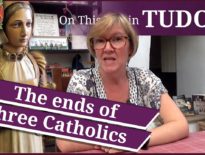On this day in Tudor history, 28th February 1540, Protestant Thomas Forret was burned at the stake in Castle Hill, Edinburgh, in the presence of King James V.
Forret was a former Augustinian monk and had spent his career teaching the common people and helping those in need. How did he come to this awful end in Edinburgh? Find out all about Thomas Forret, and why he was accused of heresy, in today's talk.
Also on this day in history, 28th February 1525, the wizard earl, Gerald Fitzgerald, 11th Earl of Kildare, was born. He spent much of his life on the run and I tell you all about it in last year’s video:
Also on this day in history:
- 1551 – Death of theologian and Protestant reformer Martin Bucer during the night of 28th February/1st March in Cambridge. He was buried in Great St Mary's Church at a funeral attended by around 3,000 people.
- 1555 – Death of Sir Robert Bowes, lawyer, Master of the Rolls and Warden of the East and Middle Marches, at Berwick while organising the defences there. Bowes was a member of Edward VI's Privy Council, and was appointed Master of the Rolls in 1552. He was also a member of Lady Jane Grey's council.
- 1556 – Burial of Stephen Gardiner, Bishop of Winchester, in a chantry tomb in Winchester Cathedral.
- 1577 – Death of Edmund Guest, Bishop of Salisbury, at Salisbury. He was buried in the cathedral choir.
- 1594 – Death of William Fleetwood, lawyer, antiquary and Queen's Serjeant, at his home in Aldersgate, London. He was buried on his estate in Great Missenden, Buckinghamshire. Fleetwood was a Member of Parliament in the reigns of Mary I and Elizabeth I, Recorder of London from 1571-1591 and Queen's Serjeant from 1592 until his death.
Transcript:
On this day in Tudor history, 28th February 1540, Protestant Thomas Forret was burned at the stake in Castle Hill, Edinburgh, in the presence of King James V. John Knox and David Calderwood record the year of his execution as 1539, but John Foxe and George Buchanan, who had actually spent time with Forret, recorded it as 1540.
Let me tell you a bit more about Forret and what led to his sad end.
Thomas Forret was the son of Thomas Forret, a man who worked as master stabler to King James IV of Scotland. Forret studied on the Continent, in Cologne, before joining Inchcolm Augustinian Abbey in the Firth of Forth in Scotland. As an Augustinian monk, he became the vicar of Dollar, in Clackmannanshire, near Stirling, being recorded as “showing the mysteries of the Scriptures to the vulgar people in English”, teaching his parishioners the ten commandments and showing them that the only way to salvation was through the blood of Jesus Christ. He also spoke out against the sale of indulgences. He was a pious man, making it his aim to memorise three chapters of the Bible every day and then getting his servant, Andrew Kirkie, to test him. When he visited sick parishioners, as well as feeding their souls with the bread of life, he would take with him bread and cheese and give them silver out of his purse.
David Calderwood quotes martyrologist John Foxe in stating that Forret was summoned before the Bishop of St Andrews and Dunkelden several times “to give account of his doctrine”, but that he managed to escape until the rise of Cardinal David Beaton.
In 1538, he was summoned to trial for heresy due to his teachings and to him using the New Testament in English. He had also attended the wedding of Thomas Cucklaw, a fellow vicar, during Lent and broke the Lent fast by eating meat there. He was condemned as a chief heretic and teacher of heresy, with four other men: Friar John Beverage, Sir Duncan Simpson, Robert Forrester and friar John Kelowe, “without permission to recant” and burned on this day in 1540.
At the place of execution, Forret was asked to say that he believed in God and Our Lady, but that he replied, “I believe in God” and “I believe as our Lady believeth”. They also took his New Testament from where he’d been holding it to his chest and cried “Heresy, heresy””, the people replying “burn him! Burn him!”. At his burning, he cried in Latin and then English, “God be merciful to me, a sinner”, and then “Lord Jesus, receive my spirit” before he recited the 51st psalm in Latin and continued doing so until they pulled the stool from under his feet.
And that was the end of martyr Thomas Forret.



Leave a Reply